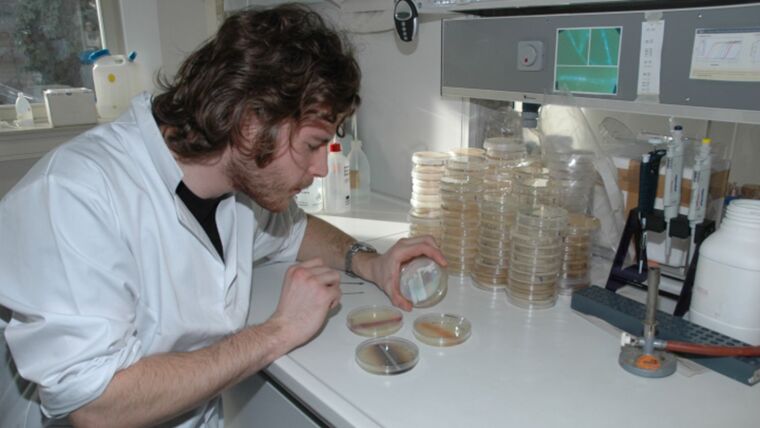
- Fundamental research and development at universities and other research institutions (e.g. Max Planck Institutes)
- Industrial research and development
- Industrial production
- Public administration
- Education and training
- Environmental protection and conservation
Microbiologists investigate biological mechanisms of microorganisms (viruses, bacteria, yeasts, algae, fungi) as well as their role in natural cycles, in order to apply the know-ledge in medicine, ecology, nutrition, agriculture and forestry. Therefore, attractive employment opportunities for microbiologists exist in research and development in these fields. There, microbiologists colaborate with representatives of adjacent research fields or economical fields (biologists of other specializations, chemists, physicists, medical researchers and engineers). The progress in the field of genome analysis and proteome analysis and in the field of gene technology is mainly based on the research conducted at the level of microorganisms. The modern biotechnological proceedings for the production of certain pharmaceutical products (e. g. antibiotics, vaccines), for wastewater treatment and for bioremediation of soil, or for the biotechnological synthesis of nutrients are based on the application of microbial cultures. Therefore, there is an increasing demand for highly qualified graduates of microbiology in the pharmaceutical industry and in biotechnology companies. Microbiologists monitor the production process in the food industry (e. g. in breweries, at the production of vine, at the processing of milk, meat, fish, fruit and vegetables and at the production of starch). They control quality and optimize processes. Also, in the chemical industry (development and production of pesticides, insecticides and desinfectants), microbiologists find occupational areas. In analytical laboratories of hospitals or in laboratories examining food hygiene, they identify harmful microorganisms and develop concepts for their abatement. Occupational fields of microbiologists also exist at the public administration (health authorities, environmental agencies). Last but not least, microbiologists are engaged in education and training (at universities, universities of applied sciences, health care schools), and trade associations and professional organizations employ microbiologists.